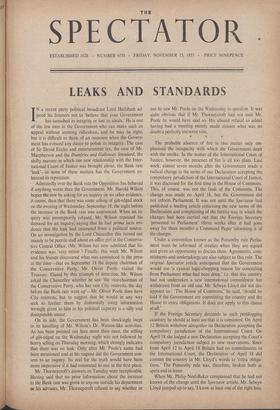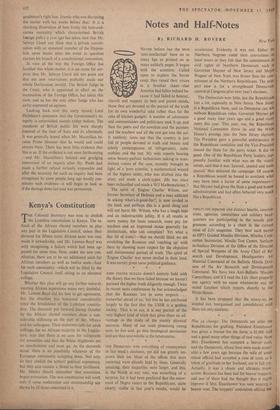LEAKS AND STANDARDS
IN a recent party political broadcast Lord Hailsham ad- jured his listeners' not to 'believe that your Government . . . has tarnished its integrity or lost its ideals.' He is one of the few men in the Government who can make such an appeal without seeming ridiculous, and he may be right, but it is difficult to think of an occasion when the Govern- ment has evinced any desire to polish its integrity. The case of Sir David Eccles and entertainment tax, the case of Mr. Macpherson and the Dumfries and Galloway Standard, the shifty manner in which our new relationship with the Inter- national Court of Justice was brought about, the Bank rate `leak'—in none of these matters has the Government en- hanced its reputation.
Admittedly over the Bank rate the Opposition has behaved if anything worse than the Government. Mr. Harold Wilson began the row by asking for an inquiry on no other evidence, it seems, than that there was some selling of gilt-edged stock on the evening of Wednesday, September 18, the night before the increase in the Bank rate was announced. When an in- quiry was peremptorily refused, Mr. Wilson repeated his demand for an inquiry, saying that he had prima facie evi- dence that the- leak had *emanated from a political source. On an investigation by the Lord Chancellor this turned out mainly to be puerile stuff about an office girl in the Conserva- tive Central Office. (Mr. Wilson has now admitted that his evidence was 'very minor!) Finally, this week Mr. Wilson and his friends discovered what was announced in the press at the time—that on September 18 the deputy chairman of the Conservative Party, Mr. Oliver Poole, visited the Treasury. Elated by this triumph of detection, Mr. Wilson asked the Chancellor whether he saw 'the vice-chairman of• the Conservative Party, who has vast City interests, the day before the Bank rate went up'—Mr. Oliver Poole does have City interests, but to suggest that he would in any way seek to further them by dishonestly using information wrongly given, to him in his political capacity is a silly and disreputable smear.
On its side, the Government has been shockingly inept in its handling of Mr. Wilson's Dr. Watson-like activities. As has been pointed out here more than once, the selling of gilt-edged on the Wednesday night was not followed by heavy selling on Thursday morning, which strongly indicates that there was no leak. Only. after Mr. Poole's name had been mentioned and at his request did the Government con- sent to an inquiry. Its zeal for the truth would have been more impressive if it had consented to one in the first place.
Mr. Thorneycroft's answers on Tuesday were inexplicable. Having said that no prior information about the increase. in the Bank rate was given to anyone outside his department or his advisers, Mr. Thorneycroft refused to say whether or not he saw Mr. Poole on the Wednesday in question. It was quite obvious that if Mr. Thorneycroft had not seen Mr. Poole he would have said so. His absurd refusal to admit having had a meeting merely made sinister what was no doubt a perfectly innocent visit.
* The probable absence of fire in this matter only em- phasised the incapacity with which the Government dealt with the smoke. In the matter of the International Court of Justice, however, the presence of fire is all too plain. Last week, almost seven months after the Government made a radical, change in the terms of our Declaration accepting the compulsory jurisdiction of the International Court of Justice, it was discussed for the first time in the House of Commons. This, of course, was not the fault of the Commons. The change was made on April 18, but the Government did not inform Parliament. It was not until the Spectator had published a leading article criticising the new terms of the Declaration and complaining of the furtive way in which the changes had been carried out that the Foreign Secretary 'presented to Parliament' (three weeks after it had gone away for three months) a Command Paper informing it of the changes.
Under a convention known as the Ponsonby rule Parlia- ment must be informed of treaties when they are signed and given an opportunity to discuss them. Agreements, com- mitments and undertakings are also subject to this rule. The original Spectator article anticipated that the Government would use 'a cynical logic-chopping reason for concealing from Parliament what had been done! i.e. that this country had not undertaken a new international commitMent but Vvithdrawn from an old one. Mr. Selwyn Lloyd did not dis- appoint us : 'The House of Commons,' he said, 'should be told if the Government are committing the country and the House to extra obligations. It does not apply to this clause at all.'
If the Foreign .Secretary descends to such pettifogging casuistry he should at least see that it is consistent. On April 12 Britain withdrew altogether its Declaration accepting the compulsory jurisdiction of the International Court. On *April 18 she lodged a new Declaration accepting the Court's compulsory jurisdiction subject to new reservations. Since from April 12 to April 18 Britain had no commitments to the International Court, the Declaration of April 18 did commit the country in Mr. Lloyd's words to 'extra obliga- tions.' The Ponsonby rule was, therefore, broken both in spirit and in letter.
When Mr. Philip Noel-Baker complained that he had not known of the change until the Spectator article, Mr. Selwyn Lloyd jumped up to say,`I know at least one of the right hon. gentleman's right hon. friends who was discussing the matter with me weeks before that.' It is a shocking illustration of how firmly the hole-and- corner mentality which characterised British fareign policy a year ago has taken root that Mr. Selwyn Lloyd can think that a private conver- sation with an unnamed member of the Opposi- tion some weeks after the event in question excuses his breach of a constitutional convention.
In view of the way the Foreign Office has handled this whole matter, it is no cause for sur- prise that Mr. Selwyn Lloyd did not point out that our new reservations probably made our whole Declaration invalid. The British Judge in the Court, who is appointed in effect on the nomination of the Foreign Office, has taken this view, and so has the only other Judge who has so far expressed an opinion.
Looking back over this sorry record, Lord Hailsham's assurance that the Government's in- tegrity is untarnished sounds rather hollow. The standards of British public life, were sharply lowered at the time of Suez and its aftermath. It was generally hoped when Mr. Macmillan be- came Prime Minister that he would and could restore them. There has been little evidence that this is so. If the evidence is not soon forthcoming —and Mr. Macmillan's belated and grudging concession" of an inquiry after Mr. Poole had made a further refusal virtually impossible and after the necessity for such an inquiry had been recognised by most people long ago hardly con- stitutes such evidence—it will begin to look as if the damage done last year was permanent.



































 Previous page
Previous page